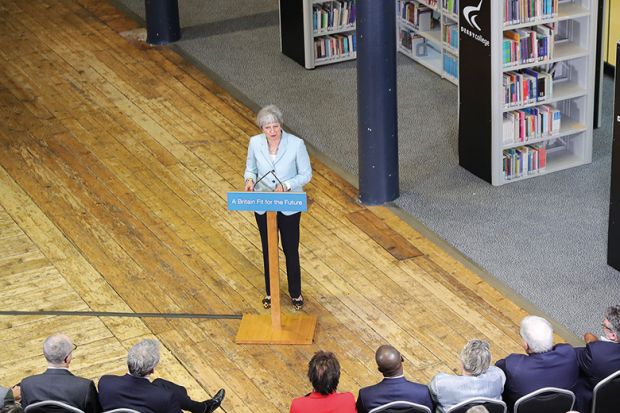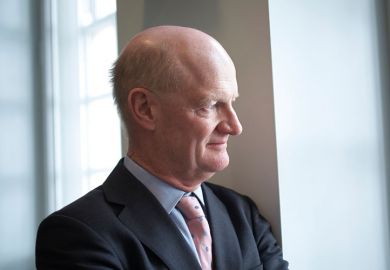The review of post-18 education funding in England is likely to bring a “measly” reduction in tuition fees, and it is a “crazy subject” for the government to tackle, according to Theresa May’s former director of communications.
Katie Perrior, who resigned as director of communications at No 10 after Ms May announced a snap general election in 2017, said that the review announced by the prime minister might deliver a “slight reduction in fees on some courses, maybe a rise in others”, but would likely ultimately prove “a bit of a waste of time”.
Ms Perrior was speaking at a Universities UK event on political affairs in higher education – which also heard from former banker Philip Augar, who is leading the government’s review – in response to an audience question from Jason McCartney, a former Conservative MP who lost his Colne Valley seat in last year’s election.
Mr McCartney, now head of public affairs at the University of Huddersfield, suggested that Labour’s policy to abolish tuition fees and reintroduce maintenance grants was a “nice straightforward one, an easy soundbite”, which the Tories were “always going to be chasing” if they tried to fight on that ground.
He asked: “Is No 10’s thinking on this they can’t really win on this, all they can do is mitigate?”
Ms Perrior replied: “I think that this is a crazy subject to try and engage on if you’re not going to have a proper offer. If it’s going to be a measly offer, don’t go there at all, in my opinion. I never felt this [tuition fees] was a huge issue that was constantly a problem, a driver around the vote in 2017 [which saw the Conservatives lose their majority].”
She added: “If we’re literally trying to challenge a man that just offers everything for free, we’re never going to win.”
Ms Perrior told Mr McCartney: “I think you’re completely right: it’s going to be measly; you’re going to be disappointed.”
She argued that limiting interest rate rises and reintroducing maintenance grants would be good choices for the Tories.
Speaking about higher education more generally during her speech, Ms Perrior said: “I think that some of the newer universities really need to give some of those redbricks a run for their money.”
She said that the role of newer universities in improving people’s lives was often “overlooked” because “politics is full of snobs” who judge people on their “academic history”.
But in light of Ms May’s commitment to diversity and social mobility, newer universities have “a moment to shine and really sell their story”, Ms Perrior suggested.
On international students and their inclusion in migration figures, Ms Perrior said that the drive to attract the brightest and best “doesn’t chime very well with Theresa May’s stance at the Home Office”, where she prioritised reducing the overall immigration total.
“All I can say is, absolutely, apart from one or two people round the Cabinet table, it’s very much a minority: nobody agrees with Theresa May on the issue of student numbers and immigration,” she said.
Mr Augar, speaking in a separate session, emphasised that the review was “not simply a review of university fees and funding”, but of all tertiary education funding, including further education.
The review panel was currently at the stage of examining the “economic and social objectives” of tertiary education and had not yet come on to discussion of potential solutions in funding, he added.
The review’s recommendations would have to take account of funding’s impact on “deficit and debt”, said Mr Augar, while also seeking a “balance” in funding between government, individuals and employers. The economic objectives for tertiary education that he listed included skills, innovation and achieving “dynamism” in cities.
On social objectives, Mr Augar said: “We aren’t just brutal marketeers on the panel. None of us think like that.”
Register to continue
Why register?
- Registration is free and only takes a moment
- Once registered, you can read 3 articles a month
- Sign up for our newsletter
Subscribe
Or subscribe for unlimited access to:
- Unlimited access to news, views, insights & reviews
- Digital editions
- Digital access to THE’s university and college rankings analysis
Already registered or a current subscriber? Login








